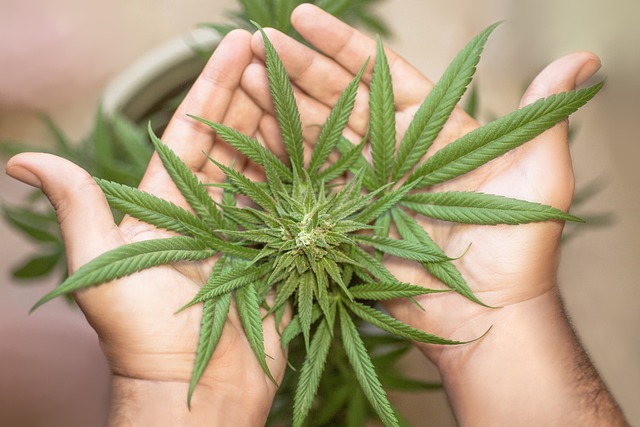In Arizona, THCA (Tetrahydrocannabinolic Acid), a non-psychoactive cannabinoid found in the Cannabis sativa plant, has gained significant attention due to its legal status and therapeutic benefits. As of early 2023, THCA is legally available for medicinal use under Arizona's medical marijuana program, as outlined by Proposition 203, and can also be purchased for recreational use in compliance with state laws from licensed dispensaries. THCA, which is converted to psychoactive THC through decarboxylation, offers potential health benefits such as pain relief, anti-inflammatory effects, and anxiolytic properties without the immediate high associated with THC. The Arizona Department of Health Services oversees the use of THCA, ensuring it meets medical needs within the regulated market. Consumers interested in exploring THCA's benefits can do so legally, with a recommendation from an Arizona-certified physician. As the legal landscape around THCA continues to evolve, consumers and businesses must stay informed about legislative changes that could impact its availability and usage in Arizona. This dynamic legal environment highlights the importance of staying educated on state regulations regarding THCA use.
Explore the intricate world of THCA flower, a non-psychoactive cannabinoid gaining attention for its therapeutic properties and legality in Arizona. This article delves into the multifaceted aspects of THCA, from its chemistry to its potential benefits, and its emerging role within the state’s cannabis market. We will navigate the legal landscape of THCA in Arizona, understand how it differs from THC, and offer guidance on sourcing and consuming this unique compound responsibly. Join us as we explore the future of THCA research and legislation, and the impact of this flower on Arizona’s medical cannabis program, all while maintaining a focus on safety and quality.
THCA Flower: A Comprehensive Overview

THCA, or Tetrahydrocannabinolic Acid, is a naturally occurring compound found within the Cannabis sativa plant, representing the acidic precursor to THC, the primary psychoactive component in cannabis. As of the latest regulations, THCA-rich flowers are legally permissible for both medicinal and recreational use in Arizona, provided they adhere to state guidelines and are sold through licensed dispensaries. These flowers contain the raw acidic form of THC, which, when properly heated or decarboxylated, converts into THC. This conversion is critical for those seeking the psychoactive effects typically associated with cannabis consumption. The THCA flower itself offers a range of benefits, including potential therapeutic properties such as pain relief, anti-inflammatory effects, and anxiolytic properties, without the immediate psychoactivity that THC presents.
Arizona’s legal landscape for cannabis has evolved to include not only THCA flowers but also a variety of derivative products, reflecting a broader acceptance of cannabinoids in both therapeutic and adult-use markets. The presence of THCA in its raw form offers users an opportunity to engage with the plant’s benefits at a different stage of the cannabinoid spectrum. Users interested in the potential health advantages can explore products like THCA flower, which, when used responsibly and within the legal framework established by Arizona state law, provide a unique experience distinct from traditional THC products. As such, THCA flowers are gaining popularity among consumers looking for alternatives to traditional cannabis products, with an emphasis on the potential wellness applications of this non-psychoactive cannabinoid.
The Legal Landscape of THCA in Arizona

In recent years, the conversation around cannabinoids has expanded beyond THC to include its non-psychoactive precursor, THCA or tetrahydrocannabinolic acid. As of the knowledge cutoff in early 2023, the legal landscape of THCA in Arizona presents a nuanced picture. Arizona’s medical marijuana program, established under Proposition 203, allows for the use of marijuana and products derived from marijuana for medical purposes. Within this framework, THCA, which exists naturally in raw cannabis plants, is technically legal as part of medical cannabis products. However, it’s important to understand the specific regulations that govern THCA within this context. The Arizona Department of Health Services oversees the program, setting forth guidelines that define permissible forms and uses of marijuana and its derivatives. Patients with a qualifying condition and a recommendation from a certified physician in Arizona can legally access THCA-containing products for therapeutic use. It’s crucial for consumers and businesses alike to stay informed on any legislative changes, as the legal status of THCA can evolve with new state legislation or federal policy shifts. This dynamic environment underscores the importance of consistent legal oversight and public education regarding the use and benefits of THCA in Arizona. As such, patients and caregivers must adhere to the state’s regulations to ensure they are within the bounds of the law when using or possessing THCA-rich products.
In recent times, the conversation surrounding cannabinoids and their effects has gained significant traction. The article has delved into the intricacies of THCA flower, shedding light on its unique properties and potential benefits. Particularly noteworthy is the legal status of THCA in Arizona, where legislative actions have paved the way for its inclusion in a burgeoning market. As the legal landscape of THCA in Arizona continues to evolve, consumers and researchers alike are presented with new opportunities to explore and understand this cannabinoid’s role within the broader cannabis ecosystem. The comprehensive overview provided underscores the importance of staying informed on the legalities and scientific advancements related to THCA flower, ensuring that individuals can make educated decisions based on the latest information available.
